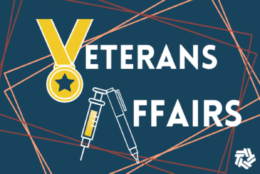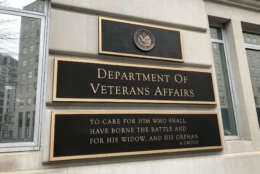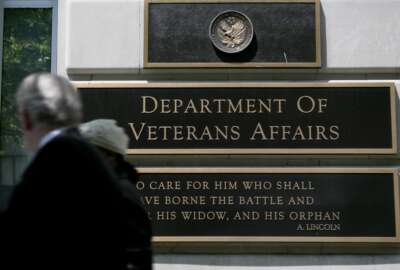
New accountability office hasn’t made a dent in VA’s ‘culture of retaliation,’ whistleblowers say
The Department of Veterans Affairs is developing new training and policies for both employees and investigators within the agency's Office of Accountability and...
Best listening experience is on Chrome, Firefox or Safari. Subscribe to Federal Drive’s daily audio interviews on Apple Podcasts or PodcastOne.
The Department of Veterans Affairs is preparing new policies, training and guidelines that it says should help the agency — and its still-relatively-new Office of Accountability and Whistleblower Protection — better foster a supportive culture for whistleblowers.
VA’s Office of Accountability and Whistleblower Protection (OAWP) has had consistent leadership in Tamara Bonzanto, a veteran, registered nurse and former House VA Committee investigator, for six months now.
“I understand that whistleblowers have a critical role in stopping misconduct within the organization,” she told the House VA Subcommittee on Oversight and Investigations at Tuesday’s hearing on the topic. “The Secretary and I value all VA employees and whistleblowers and their commitment to improving care and services for our veterans. I want VA to be a place where an employee can trust that his or her management will take allegations of retaliation or wrongdoing seriously.”
Yet VA employees, senior executives and the whistleblower community haven’t quite warmed up to Bonzanto’s office during her relatively short tenure.
“We certainly welcome the calls for improved culture and attitude, and we welcome Dr. Bonzanto’s appointment,” Tom Devine, legal director of the Government Accountability Project, told the subcommittee. “The whistleblower community pledges full support for her. But better attitudes at the top aren’t a substitute for results, and the results aren’t getting better from our experience.”
Three VA whistleblowers detailed their experiences with retaliation to members of the House Veterans subcommittee at a hearing last month. They described a decades-long culture of retaliation, which they say has continued even after the 2014 wait time scandal brought these challenges to light and Congress passed new legislation.
Related Stories
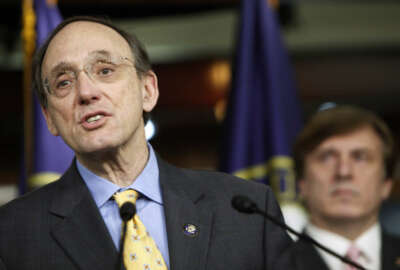
VA insists it’s not using the accountability act to target low-ranking employees

One year in, VA employees still approach accountability office with caution
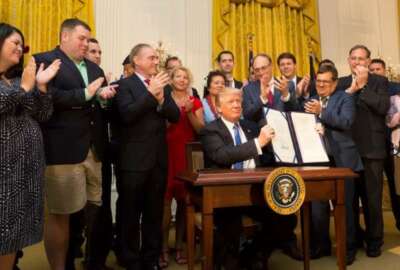 Exclusive
Exclusive Under new accountability act, VA employees fear one mistake will cost them their jobs
When Wiggins’ lawyers reviewed a copy of the supporting evidence OAWP had given to the proposing official on her case, they discovered the documents had been tampered with, SEA said.
The department ultimately determined the charges against Wiggins were unsubstantiated. OAWP, however, notified her of two additional investigations, SEA said.
“This sequence of events show that the office designed to protect whistleblowers from retaliation acted contrary to the principle of their duty by retaliating against a civil servant who uncovered and disclosed OAWP’s own unlawful conduct,” SEA President Bill Valdez said in a July 16 letter to the House subcommittee. “OAWP has created a climate in which whistleblowers are meant to fear the office that is meant to make them feel protected.”
Her disclosures represent “an endemic problem within OAWP that only Congress can remedy with appropriate oversight and statutory reform,” SEA added.
VA’s inspector general was more forgiving.
“It certainty takes time to change culture,” Michael Missal, the department’s IG, said. “That culture was in place for a number of years. A little more than a year ago, we were dealing with the Office of Accountability and Whistleblower Protection by fighting with them about access to documents. Certainly we’ve come a long way from that time. With Dr. Bonzanto’s leadership, they’re headed in the right direction. It’s going to take time, and with whistleblowers they have to prove to them that it’s a place where they feel comfortable coming forward and there will not be adverse actions against them.”
Bonzanto and her office is developing a variety of new policies that she said will address some of the concerns lawmakers heard from whistleblowers last month.
Investigative directives that describe what OAWP employees do and how specifically they should handle certain cases should be ready by Oct. 1, she said. Among those directives are a series of checklists that OAWP investigators can use as a standard guide when working through cases.
Not referring a case for investigation back to the VA manager who was potentially involved in the initial retaliation in the first place will be one of those guiding practices, Bonzanto said. VA whistleblowers had previously told the Government Accountability Office those scenarios were happening.
Other policies will further explain the whistleblower disclosure process and communication procedures with complainants, which Bonzanto said should be available by the end of 2019.
Whistleblower training, soft skills for investigators
In addition, OAWP is also working with the VA IG and the Office of Special Counsel on new training for the department’s workforce, which will cover how an employee can make a disclosure, what retaliation looks like and the consequences.
Bonzanto said that training will be available near the end of the year.
Missal, however, suggested actual implementation of that training had been held up top leadership.
“We hope it’s sooner than later, but it’s been months in the works.” Missal said of the new training course. “We keep [saying], another step needs to happen, another step needs to happen.”
New policies and educational courses may help, but Bonzanto acknowledged her own employees and investigators need additional training opportunities.
“Empathizing with whistleblowers and understanding their perspective — those are skills that have to be developed with my staff, and I’m working on that, she said.
Communication with whistleblowers about their status within the process also need to improve, Bonzanto added.
“Customer service … is a soft skill,” she said. “[They need to understand] that there might be a fear of retaliation. Giving them confidence in the system and understanding that they’re putting their jobs on the line [by] coming forward, that’s something that we’re working on improving internally to OAWP.”
Confusion compounds resource problems for IG, OSC
Bonzanto’s OAWP, of course, is only one piece of the whistleblower disclosure puzzle. Whistleblowers can report retaliation to the Office of Special Counsel or make a complaint to the VA IG.
But employees are often confused about who they should report their disclosures to, Missal said.
“It’s all levels at the VA. Some of the more senior people don’t really understand the relationship between OAWP, OSC [and] OIG,” he said. “That’s why we feel so strongly that VA ought to put out a training that we’ve prepared on when to come to the OIG [and] when to come to some of the other avenues. We hope that training gets implemented.”
Whistleblowers who don’t know where to go often make a disclosure to multiple agencies, which overwhelms VA’s Office of Inspector General and the governmentwide Office of Special Counsel.
The VA OIG received 35,000 contacts last fiscal year, Missal said. A small percentage of those complaints become whistleblower investigations, which Missal said is largely due to resources.
The OIG runs on a budget of $192 million and 950 employees, which Missal said has remained relatively flat in recent years, even as the department itself grows larger.
The Office of Special Counsel, which has a backlog of 2,600 cases to date, is similarly constrained by resources.
“The consequences are we just don’t get to someone’s case, which means you might have a very meritorious case of whistleblower retaliation,” Special Counsel Henry Kerner told the subcommittee. “Unfortunately by the time our examiner gets to that, weeks or months have gone by.”
Kerner said his agency has reorganized staff in an effort to streamline its operations but could use more staff as more federal employees file more disclosures every year.
Disclosures from VA employees comprise some 35% of OSC’s annual case intake of roughly 6,000, Kerner added.
Members on the House VA subcommittee seemed concerned by the IG and OSC’s staffing challenges — and are anxious to track OAWP’s progress.
Missal’s office, meanwhile, is expected to release a report on VA’s OAWP soon. The House committee will examine the report at a hearing scheduled for September.
Copyright © 2025 Federal News Network. All rights reserved. This website is not intended for users located within the European Economic Area.
Nicole Ogrysko is a reporter for Federal News Network focusing on the federal workforce and federal pay and benefits.
Follow @nogryskoWFED



